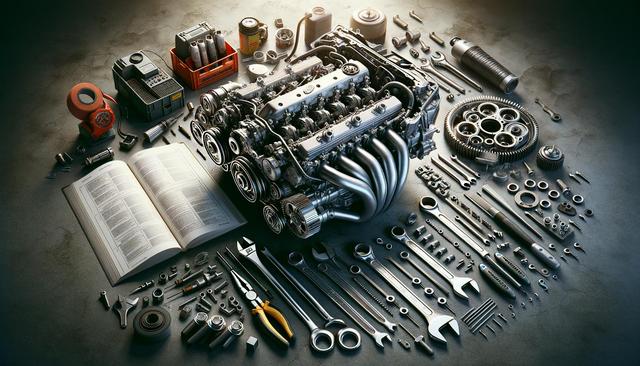The Importance of Learning Automotive Engine Repair
In today’s fast-paced automotive industry, having hands-on skills in engine repair is becoming increasingly valuable. Vehicles are more complex than ever, and properly trained professionals are in high demand to inspect, diagnose, and repair engine-related issues. Whether you’re an aspiring mechanic or already working in a garage and looking to upgrade your skills, enrolling in an engine repair course can provide you with the foundational knowledge and practical experience needed to succeed. These courses not only cover theory but also offer real-world applications that mirror modern automotive challenges.
Automotive engine repair courses often include modules that focus on various engine systems, including fuel injection, ignition, cooling, lubrication, and emission control. Understanding how these systems work together is essential for accurate diagnostics and effective repairs. In addition, many training programs provide opportunities to work with diagnostic tools and software, helping students become familiar with industry-standard technology. This comprehensive training ensures you’re better prepared for certification exams and employment in diverse work environments, such as dealerships, independent repair shops, or fleet maintenance facilities.
What to Expect in a Typical Engine Repair Course
A well-structured engine repair course is designed to take learners through the essentials of engine performance and repair techniques. Students can expect a mix of classroom instruction and hands-on lab sessions. The curriculum usually begins with basic engine operation and gradually moves into more advanced topics, allowing a smooth progression regardless of prior experience. These courses are often led by experienced instructors who bring real-world insights into the learning environment.
Key components of a typical course may include:
- Diagnosis and troubleshooting of engine performance problems
- Disassembly and reassembly of engine components
- Use of diagnostic tools and scan equipment
- Interpretation of technical manuals and service data
Some programs also include soft skills training, such as communication and customer service, which are essential for working in client-facing roles. The aim is to produce well-rounded professionals who not only understand the mechanics but can also explain issues and solutions clearly to vehicle owners.
Benefits of Professional Training in Engine Repair
Enrolling in a certified engine repair course offers several advantages for those looking to enter or advance in the automotive repair field. First and foremost, it equips you with the technical skills needed to perform complex repairs safely and efficiently. This can lead to higher job satisfaction, better job security, and more opportunities for career advancement. Employers are more likely to hire and promote individuals who have formal training and credentials.
Additional benefits include:
- Increased confidence when working on different engine types
- Access to up-to-date information on industry standards and technologies
- Networking opportunities with instructors and peers
- Preparation for industry certification exams, such as ASE
These courses are also an excellent stepping stone for those considering further education in automotive technology or engineering. They provide a strong foundation that can be built upon with additional specializations or certifications.
Finding the Right Course for Your Goals
Choosing the right engine repair training program is crucial to your success in the automotive field. Factors to consider include course content, instructor experience, facility quality, and the availability of certification. Look for programs that offer a balanced mix of theory and practical application, as this will ensure a more complete understanding of engine systems and repair techniques. Accreditation is another important aspect; accredited programs often meet higher educational standards and are more widely recognized by employers.
When researching courses, consider the following:
- Duration of the program and flexibility (full-time, part-time, evening classes)
- Availability of hands-on training with actual engines
- Support services such as job placement assistance
- Costs and financial aid options
Some training centers also offer specialized modules, such as hybrid or diesel engine repair, which can be valuable if you’re targeting a specific niche. Ultimately, the right course should align with your career goals and offer the resources needed to help you grow professionally.
How Training Prepares You for Real-World Challenges
Engine repair courses are designed not only to teach technical skills but also to prepare students for the realities of working in the automotive industry. Modern vehicles come with increasingly complex systems, and the ability to quickly diagnose and repair engine problems is a critical skill. These courses simulate real-world conditions, allowing students to practice their skills under the guidance of experienced professionals.
In addition to technical instruction, many programs emphasize problem-solving, safety practices, and teamwork. Working in a collaborative environment helps students develop the communication and interpersonal skills necessary to thrive in a shop setting. Many training programs also use case studies and customer scenarios to teach students how to handle difficult situations, prioritize tasks, and manage time effectively.
By the time students complete their training, they are typically well-prepared to handle a variety of engine-related issues, from routine maintenance to complete rebuilds. This readiness not only enhances job performance but also builds a reputation for reliability and professionalism—qualities that are highly valued in the automotive repair industry.
Conclusion: Starting Your Engine Repair Career
Investing in an automotive engine repair course is a practical and impactful way to launch or advance your career in the automotive industry. These programs provide the essential tools, knowledge, and hands-on experience required to meet the demands of modern vehicle repair. Whether you’re starting from scratch or looking to enhance your existing skills, comprehensive training can open new doors and help you build a rewarding, long-term career.
As the industry continues to evolve, those with formal education and up-to-date skills will be better positioned to adapt and succeed. By choosing the right course, committing to continuous learning, and gaining real-world experience, you can confidently move forward on your path to becoming a skilled engine repair professional.




Leave a Reply